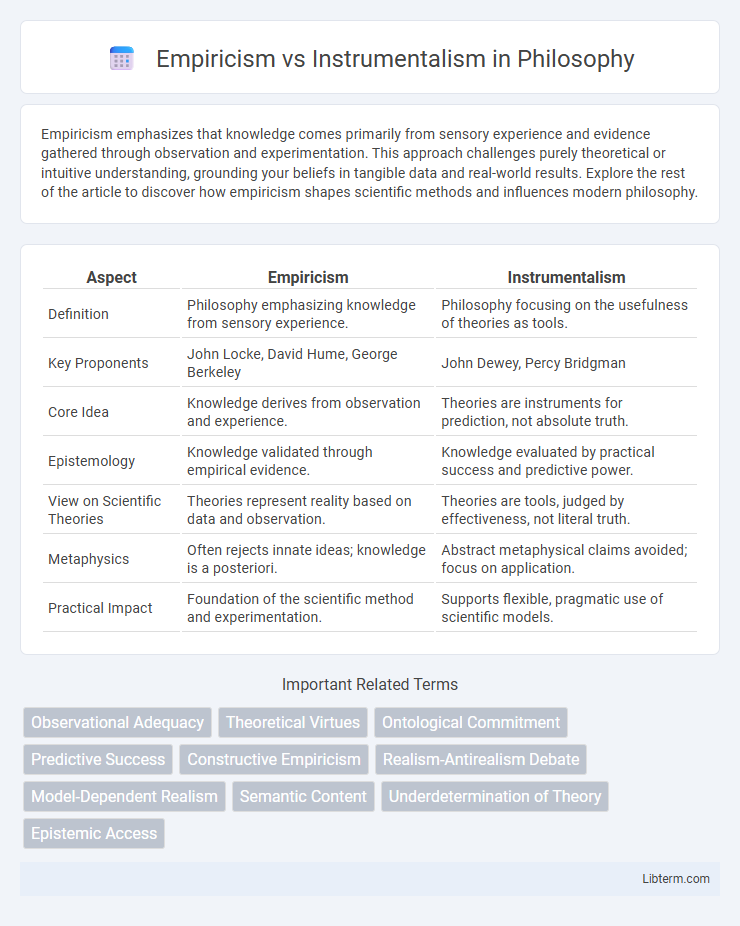Empiricism emphasizes that knowledge comes primarily from sensory experience and evidence gathered through observation and experimentation. This approach challenges purely theoretical or intuitive understanding, grounding your beliefs in tangible data and real-world results. Explore the rest of the article to discover how empiricism shapes scientific methods and influences modern philosophy.
Table of Comparison
| Aspect | Empiricism | Instrumentalism |
|---|---|---|
| Definition | Philosophy emphasizing knowledge from sensory experience. | Philosophy focusing on the usefulness of theories as tools. |
| Key Proponents | John Locke, David Hume, George Berkeley | John Dewey, Percy Bridgman |
| Core Idea | Knowledge derives from observation and experience. | Theories are instruments for prediction, not absolute truth. |
| Epistemology | Knowledge validated through empirical evidence. | Knowledge evaluated by practical success and predictive power. |
| View on Scientific Theories | Theories represent reality based on data and observation. | Theories are tools, judged by effectiveness, not literal truth. |
| Metaphysics | Often rejects innate ideas; knowledge is a posteriori. | Abstract metaphysical claims avoided; focus on application. |
| Practical Impact | Foundation of the scientific method and experimentation. | Supports flexible, pragmatic use of scientific models. |
Introduction to Empiricism and Instrumentalism
Empiricism emphasizes knowledge derived from sensory experience and observation as the foundation of scientific understanding. Instrumentalism views scientific theories primarily as tools for predicting phenomena rather than as true descriptions of reality. Both perspectives influence the interpretation and application of scientific models, shaping debates on the nature and purpose of scientific inquiry.
Defining Empiricism: Core Principles
Empiricism emphasizes knowledge derived from sensory experience and observation as the foundation of understanding, rejecting innate ideas or purely rationalist approaches. Core principles include the reliance on empirical evidence, the verification of hypotheses through experimentation, and the belief that concepts must be grounded in observable phenomena. This philosophical stance underpins scientific methods, prioritizing data and reproducibility in the formation of knowledge.
Instrumentalism Explained: Key Concepts
Instrumentalism emphasizes the practical application of scientific theories as tools for prediction and problem-solving rather than as literal descriptions of reality. It focuses on the usefulness of concepts and models in explaining observable phenomena without committing to their truth or existence. This perspective prioritizes empirical adequacy and pragmatic success over metaphysical interpretations, aligning science with effective action instead of absolute truth.
Historical Development of Empiricism
Empiricism, emerging prominently in the 17th century with philosophers like John Locke, George Berkeley, and David Hume, emphasizes knowledge derived from sensory experience and observation. This historical development arose as a challenge to rationalism, advocating that human understanding is primarily shaped by empirical evidence rather than innate ideas. Empiricism laid the foundation for the scientific method, influencing modern experimental science and contrasting with instrumentalism, which prioritizes the practical utility of theories over their literal truth.
The Rise of Instrumentalism in Philosophy of Science
The rise of instrumentalism in the philosophy of science emphasizes the predictive power of scientific theories over their literal truth, contrasting sharply with empiricism's focus on knowledge derived solely from sensory experience. Instrumentalism regards theories as useful tools or instruments for explaining and predicting phenomena, rather than as definitive descriptions of reality. This shift gained prominence in the early 20th century with thinkers like John Dewey and later logical positivists advocating a pragmatic approach to scientific inquiry.
Major Differences: Empiricism vs Instrumentalism
Empiricism emphasizes knowledge derived from sensory experience and observational evidence, asserting that theories must be rooted in observable phenomena. Instrumentalism views scientific theories as tools or instruments for predicting outcomes rather than true descriptions of reality, prioritizing usefulness over literal truth. The major difference lies in empiricism's commitment to empirical verification versus instrumentalism's focus on the practical efficacy of theories regardless of their ontological accuracy.
Empiricism in Scientific Methodology
Empiricism in scientific methodology emphasizes observation and experimental evidence as the foundation for knowledge, prioritizing data-driven conclusions over theoretical speculation. It asserts that all scientific concepts and theories must be grounded in empirical data gathered through sensory experience and systematic experimentation. This approach underpins the validation and reproducibility of scientific findings, ensuring that hypotheses are tested against measurable and observable phenomena.
Instrumentalism in Modern Science
Instrumentalism in modern science emphasizes the practical utility of scientific theories as tools for prediction and problem-solving rather than as literal truths about reality. This approach prioritizes the effectiveness of models and hypotheses in generating accurate predictions and guiding experimental outcomes, highlighting their role in technological advancement and applied research. Instrumentalism contrasts with empiricism by focusing less on observation as the sole basis of knowledge and more on the operational success of scientific instruments and theories.
Critiques and Debates Surrounding Both Theories
Empiricism faces critiques for relying heavily on sensory experience, which may not capture abstract concepts or unobservable phenomena, leading to potential gaps in knowledge acquisition. Instrumentalism is debated for its pragmatic approach, criticized for neglecting the truth value of theories and focusing solely on their predictive utility, which some argue undermines scientific realism. Both theories spark ongoing discussions about the nature of scientific knowledge, truth, and the role of observation versus practicality in theory evaluation.
Conclusion: Implications for Scientific Inquiry
Empiricism emphasizes the importance of sensory experience and observation as the foundation of scientific knowledge, promoting rigorous data collection and experimental validation. Instrumentalism, prioritizing the utility of theories as predictive tools rather than their literal truth, encourages flexibility in scientific models and adaptability to new evidence. The interplay between empiricism and instrumentalism shapes scientific inquiry by balancing the demand for empirical evidence with the practical application of theoretical frameworks.
Empiricism Infographic

 libterm.com
libterm.com